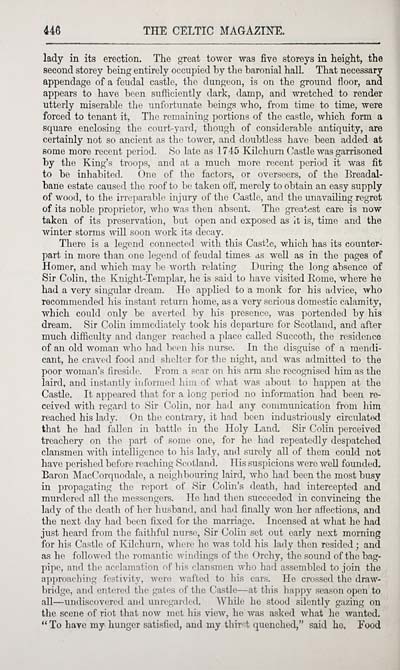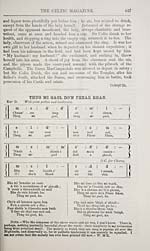Blair Collection > Celtic magazine > Volume 2
(456)
Download files
Complete book:
Individual page:
Thumbnail gallery: Grid view | List view

446 THE CELTIC MAGAZINE.
lady in its erection. The great tower was five storeys in height, the
second storey being entirely occupied by the baronial hall. That necessary
appendage of a feudal castle, the dungeon, is on the ground floor, and
appears to have been sufficiently dark, damp, and wretched to render
utterly miserable the unfortunate beings who, from time to time, were
forced to tenant it, The remaining portions of the castle, which form a
square enclosing the court-yard, though of considerable antiquity, are
certainly not so ancient as the tower, and doubtless have been added at
some more recent period. So late as 1745 Kilchurn Castle was garrisoned
by the King's troops, and at a much more recent period it was fit
to be inhabited. One of the factors, or overseers, of the Breadal-
bane estate caused the roof to be taken off, merely to obtain an easy supply
of wood, to the irreparable injury of the Castle, and the unavailing regret
of its noble proprietor, who was then absent. The greatest care is now
taken of its preservation, but open and exposed as it is, time and the
winter storms will soon work its decay.
There is a legend connected with this Castle, which has its counter-
part in more than one legend of feudal times, as well as in the pages of
Homer, and which may be worth relating During the long absence of
Sir Colin, the Knight-Templar, he is said to have visited Eome, where he
had a very singidar dream. He applied to a monk for his advice, who
recommended his instant return home, as a very serious domestic calamity,
which could only be averted by his presence, was portended by his
dream. Sir Colin immediately took his departure for Scotland, and after
much difficulty and danger reached a place called Succoth, the residence
of an old woman who had been his nurse. In the disguise of a mendi-
cant, he craved food and shelter for the night, and was admitted to the
poor woman's fireside. From a scar on his arm she recognised him as the
laird, and instantly informed him of what was about to happen at the
Castle. It appeared that for a long period no information had been re-
ceived with regard to Sir Colin, nor had any communication from him
reached his lady. On the contrary, it had been industriously circulated
that he had fallen in battle in the Holy Land. Sir Colin perceived
treachery on the part of some one, for he had repeatedly despatched
clansmen with intelligence to his lady, and surely all of them could not
have perished before reaching Scotland. His suspicions were weU founded.
Baron MacCorquodale, a neighbouring laird, who had been the most busy
in propagating the report of Sir Colin's death, had intercepted and
murdered all the messengers. He had then succeeded in convincing the
lady of the death of her husband, and had finally won her affections, and
the next day had been fLxed for the marriage. Incensed at what he had
just heard from the faithfid nurse, Sir Colin set out early next morning
for his Castle of KUchurn, where he was told his lady then resided ; and
as he followed the romantic windings of the Orchy, the sound of the bag-
pipe, and the acclamation of his clansmen who had assembled to join the
approaching tostivity, were wafted to his ears. He crossed the draAv-
bridge, and entered the gates of the Castle — at this happy season open to
all — undiscovered and unregarded. While he stood silently gazing on
the scene of riot that now met his view, he was asked what he wanted.
" To have my hunger satisfied, and my thirst quenched," said he, Foocl
lady in its erection. The great tower was five storeys in height, the
second storey being entirely occupied by the baronial hall. That necessary
appendage of a feudal castle, the dungeon, is on the ground floor, and
appears to have been sufficiently dark, damp, and wretched to render
utterly miserable the unfortunate beings who, from time to time, were
forced to tenant it, The remaining portions of the castle, which form a
square enclosing the court-yard, though of considerable antiquity, are
certainly not so ancient as the tower, and doubtless have been added at
some more recent period. So late as 1745 Kilchurn Castle was garrisoned
by the King's troops, and at a much more recent period it was fit
to be inhabited. One of the factors, or overseers, of the Breadal-
bane estate caused the roof to be taken off, merely to obtain an easy supply
of wood, to the irreparable injury of the Castle, and the unavailing regret
of its noble proprietor, who was then absent. The greatest care is now
taken of its preservation, but open and exposed as it is, time and the
winter storms will soon work its decay.
There is a legend connected with this Castle, which has its counter-
part in more than one legend of feudal times, as well as in the pages of
Homer, and which may be worth relating During the long absence of
Sir Colin, the Knight-Templar, he is said to have visited Eome, where he
had a very singidar dream. He applied to a monk for his advice, who
recommended his instant return home, as a very serious domestic calamity,
which could only be averted by his presence, was portended by his
dream. Sir Colin immediately took his departure for Scotland, and after
much difficulty and danger reached a place called Succoth, the residence
of an old woman who had been his nurse. In the disguise of a mendi-
cant, he craved food and shelter for the night, and was admitted to the
poor woman's fireside. From a scar on his arm she recognised him as the
laird, and instantly informed him of what was about to happen at the
Castle. It appeared that for a long period no information had been re-
ceived with regard to Sir Colin, nor had any communication from him
reached his lady. On the contrary, it had been industriously circulated
that he had fallen in battle in the Holy Land. Sir Colin perceived
treachery on the part of some one, for he had repeatedly despatched
clansmen with intelligence to his lady, and surely all of them could not
have perished before reaching Scotland. His suspicions were weU founded.
Baron MacCorquodale, a neighbouring laird, who had been the most busy
in propagating the report of Sir Colin's death, had intercepted and
murdered all the messengers. He had then succeeded in convincing the
lady of the death of her husband, and had finally won her affections, and
the next day had been fLxed for the marriage. Incensed at what he had
just heard from the faithfid nurse, Sir Colin set out early next morning
for his Castle of KUchurn, where he was told his lady then resided ; and
as he followed the romantic windings of the Orchy, the sound of the bag-
pipe, and the acclamation of his clansmen who had assembled to join the
approaching tostivity, were wafted to his ears. He crossed the draAv-
bridge, and entered the gates of the Castle — at this happy season open to
all — undiscovered and unregarded. While he stood silently gazing on
the scene of riot that now met his view, he was asked what he wanted.
" To have my hunger satisfied, and my thirst quenched," said he, Foocl
Set display mode to: Large image | Transcription
Images and transcriptions on this page, including medium image downloads, may be used under the Creative Commons Attribution 4.0 International Licence unless otherwise stated. ![]()
| Early Gaelic Book Collections > Blair Collection > Celtic magazine > Volume 2 > (456) |
|---|
| Permanent URL | https://digital.nls.uk/78485626 |
|---|
| Description | Volume II, 1877. |
|---|---|
| Shelfmark | Blair.3 |
| Attribution and copyright: |
|
| Description | A selection of books from a collection of more than 500 titles, mostly on religious and literary topics. Also includes some material dealing with other Celtic languages and societies. Collection created towards the end of the 19th century by Lady Evelyn Stewart Murray. |
|---|
| Description | Selected items from five 'Special and Named Printed Collections'. Includes books in Gaelic and other Celtic languages, works about the Gaels, their languages, literature, culture and history. |
|---|

